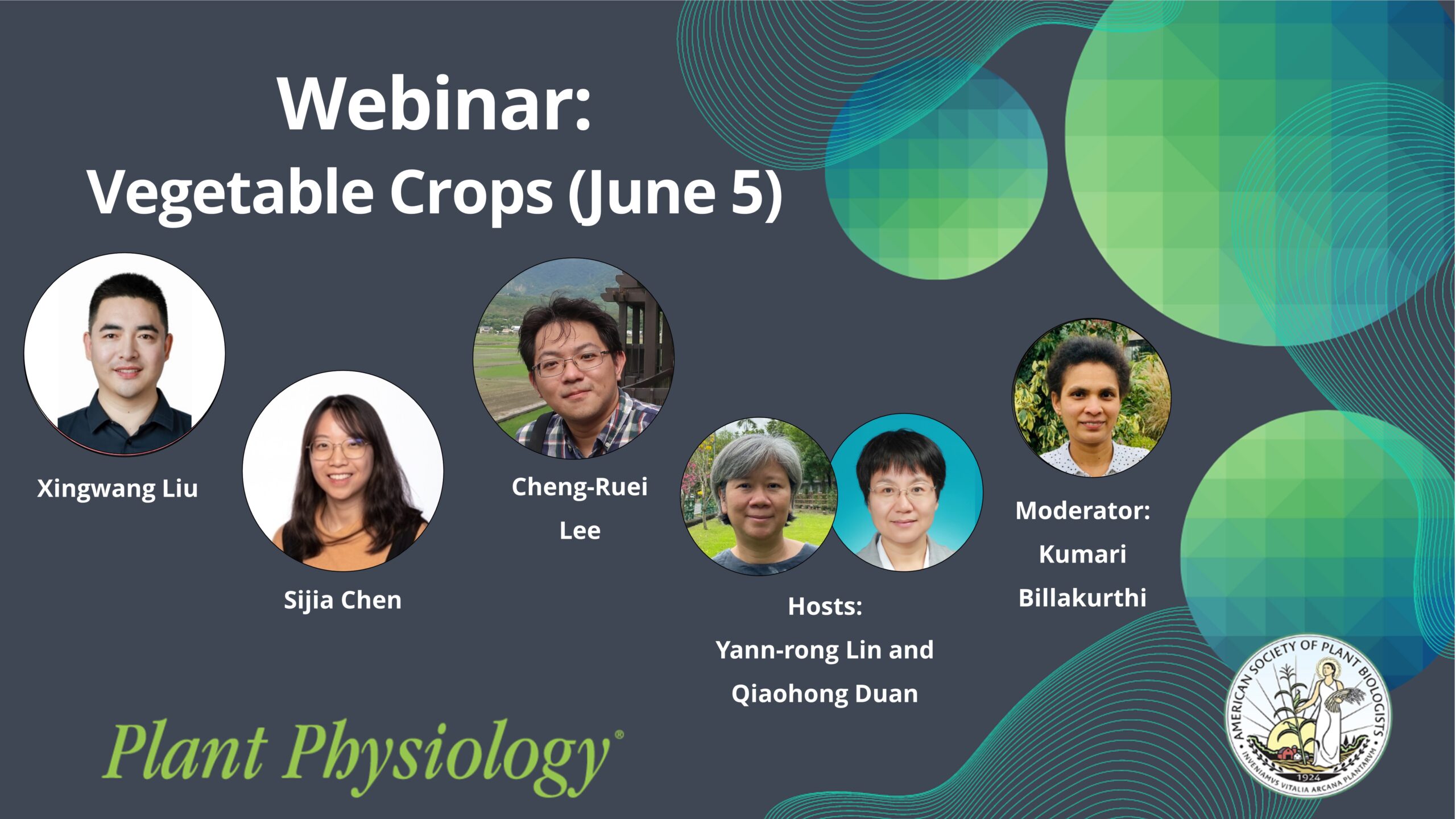Plant Physiology Webinar: Vegetable Crops
Celebrating the June 2024 Focus Issue on Vegetable Crops
Recorded Wednesday June 5, 2024
About this webinar
Vegetable crops encompass over 200 plant species utilized as human food. They have been domesticated from their wild progenitors that have undergone a process influenced by human preferences and diverse environmental factors. Because edible parts (organs) of vegetable crops are quite different for each crop, goals in physiological research and breeding are quite different for each crop. Vegetables, like other crops, have faced threats from abiotic and biotic stresses such as global climate change, decreasing arable land, and soil erosion. Overcoming these challenges requires a deep understanding of the fundamental biology and genetics of the crops. Additionally, vegetable breeding needs to consider consumers’ preference and market demands. Integrating high throughput phenotyping data and artificial intelligence analyses will enable smart agriculture in the vegetable industry. Therefore, basic research in plant physiology and genetics can provide guidance for cultivation practice and breeding of vegetable crops, achieving sustainable agriculture and increasing food security.
The June 2024 Focus Issue of Plant Physiology, edited by Qiaohong Duan, Jin Hoe Huh, Yann-rong Lin, and Leo F.M. Marcelis, spotlights research on vegetable crops. This webinar features speakers Xingwang Liu, Sijia Chen, and Cheng-Ruei Lee, who share findings from their work appearing in this Focus Issue. The webinar is hosted by Plant Physiology Monitoring Editors Yann-rong Lin and Qiaohong Dua, and is moderated by Plant Physiology Assistant Features Editor Kumari Billakurthi.
SPEAKERS
Xingwang Liu: Mutating the maternal haploid inducer gene CsDMP in cucumber produces haploids in planta
 Xingwang is an Associate Professor in Vegetable Science Department at China Agricultural University (CAU). He got his PhD degree in 2014 from China Agricultural University. From Sep 2011 to Sep 2013, he studied at Cornell University, USA. He mainly focuses on cucumber fruit quality improvement research to understand the genetic basis of fruit trait development such trichome/spine and peel glossiness. He strives to develop new germplasm using biotechnological approaches.
Xingwang is an Associate Professor in Vegetable Science Department at China Agricultural University (CAU). He got his PhD degree in 2014 from China Agricultural University. From Sep 2011 to Sep 2013, he studied at Cornell University, USA. He mainly focuses on cucumber fruit quality improvement research to understand the genetic basis of fruit trait development such trichome/spine and peel glossiness. He strives to develop new germplasm using biotechnological approaches.
Sijia Chen: The effect of far-red in the fruit set of sweet pepper – What is the role of apical dominance?

Sijia is a last year PhD candidate in the chair group of Horticulture & Product Physiology (Wageningen University, the Netherlands) under the supervision of Dr. Ep Heuvelink, Prof. Leo Marcelis, and Prof. Remko Offringa. She received her master degree in 2019 from Wageningen University and her undergraduate degree in 2017 from Nankai University in China. Her PhD research investigates how fruit set of sweet pepper can respond to different light spectra, by studying plant architecture, morphology, and physiological changes.
Cheng-Ruei Lee: Variable patterns of molecular variation during crop domestication
 Cheng-Ruei is an Associate Professor jointly affiliated with the Institute of Ecology and Evolutionary Biology and the Institute of Plant Biology at National Taiwan University. Previously working on the population genetics of wild Brassicaceae species (Arabidopsis and Boechera), his lab now works on Asian crop domestication process and the evolution of crop wild relatives. Recent works involve the evolutionary history of bitter gourd (Momordica charantia) and how ecological factors affect the expansion route and morphological diversification of mungbean (Vigna radiata).
Cheng-Ruei is an Associate Professor jointly affiliated with the Institute of Ecology and Evolutionary Biology and the Institute of Plant Biology at National Taiwan University. Previously working on the population genetics of wild Brassicaceae species (Arabidopsis and Boechera), his lab now works on Asian crop domestication process and the evolution of crop wild relatives. Recent works involve the evolutionary history of bitter gourd (Momordica charantia) and how ecological factors affect the expansion route and morphological diversification of mungbean (Vigna radiata).
HOSTS
Yann-rong Lin, Plant Physiology Monitoring Editor
 Yann-rong is a professor in the Department of Agronomy, National Taiwan University. She is interested in basic research on crop genetics and variety improvement. Her research focuses on unveiling germplasm genetic diversity, uncovering QTLs by using biparental mapping and genome wide association studies, and isolating genes by positional cloning.
Yann-rong is a professor in the Department of Agronomy, National Taiwan University. She is interested in basic research on crop genetics and variety improvement. Her research focuses on unveiling germplasm genetic diversity, uncovering QTLs by using biparental mapping and genome wide association studies, and isolating genes by positional cloning.
Qiaohong Duan, Plant Physiology Monitoring Editor
 Qiaohong is a professor in the College of Horticulture Science and Engineering, Shandong Agricultural University, China. She studies the molecular mechanisms underlying fertilization events in flowering plants, particularly the Cruciferous family vegetable plants, under normal and complex situations as encountered in nature. Qiaohong’s research combines physiological, molecular, genetics, and biochemical approaches.
Qiaohong is a professor in the College of Horticulture Science and Engineering, Shandong Agricultural University, China. She studies the molecular mechanisms underlying fertilization events in flowering plants, particularly the Cruciferous family vegetable plants, under normal and complex situations as encountered in nature. Qiaohong’s research combines physiological, molecular, genetics, and biochemical approaches.
MODERATOR
Kumari Billakurthi, Plant Physiology Assistant Features Editor
 Kumari Billakurthi is a postdoctoral research associate with a keen interest in understanding the gene regulatory networks that determine the development of C4-specific leaf anatomy. She works in the lab of Julian Hibberd at the University of Cambridge, England. She did her PhD in the group of Peter Westhoff at Heinrich Heine University in Germany.
Kumari Billakurthi is a postdoctoral research associate with a keen interest in understanding the gene regulatory networks that determine the development of C4-specific leaf anatomy. She works in the lab of Julian Hibberd at the University of Cambridge, England. She did her PhD in the group of Peter Westhoff at Heinrich Heine University in Germany.

